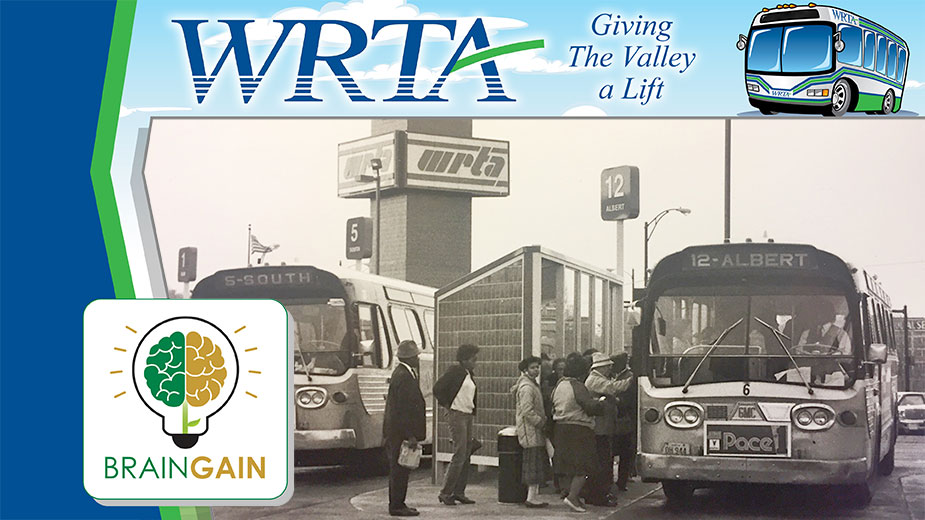YOUNGSTOWN, Ohio – The Western Reserve Transit Authority plans to commemorate 50 years of service to the Mahoning Valley this month, reflecting on half a century of public transportation and looking toward its future.
“We’re asking for some proclamations and people to come and celebrate WRTA’s 50 years of commitment to the region,” says Dean Harris, executive director.
An event is scheduled for Oct. 15 at the downtown Federal Street hub, Harris says. The celebration corresponds with a marketing campaign spearheaded by Farris Marketing, Boardman.
“The main purpose is to get the information out to the public who needs to use the service,” says George Farris, CEO of Farris Marketing. “We want to increase ridership and encourage people to ride.”
Farris adds that the marketing effort is intended to help the community understand the value of the service to the Mahoning Valley. “I think it’s great we’ve succeeded over the last 50 years,” he says. “If anything, it’s more important than ever.”
The 50th anniversary event will coincide with the release of a new jingle and animated TV spot that takes cues from one used during the 1990s. “It should come out around the same day” as the Oct. 15 event, Farris says.
The commemoration will also touch upon WRTA’s future, including the adoption of autonomous vehicles and other technologies used in modern transportation.
“There’s also going to be a surprise,” Farris says.

As industry grows in Lordstown, the Lordstown Express draws more riders.
The city’s earliest known mass transit system dates to 1873, when privately owned horse-drawn trolley companies competed for business. In 1890, two trolley firms merged to form the Youngstown Street Railway Co. and in 1891 the company began electric-powered streetcar service.
Other streetcar companies followed, extending service to Idora Park on the city’s South Side and eventually to Warren, Columbiana and Leetonia, as well as to Sharon and New Castle, Pa. The last city streetcar discontinued service in 1940.
In 1922, the Youngstown Municipal Railway Co. introduced the first bus service to the community and in 1957, the company was renamed the Youngstown Transit Co.
“Transit then was a private industry,” says Harris. Fifty years ago this month, WRTA was formed as a publicly funded transportation entity.
“By the 1960s, a lot of the private transit businesses were struggling and couldn’t find a way to keep the system going,” Harris says.
Legislation passed in 1970 allowed municipalities to establish their own transit authorities, thereby pushing mass transit from the private to the public sectors, he notes.
In 1971, the Youngstown Transit Co. became the publicly owned WRTA and was initially funded through property taxes from the city of Youngstown.
“From there, it grew,” Harris says.
As ridership increased, the agency embarked on a bold plan to construct a new central terminal downtown. Under the transit system’s former executive director, the late Jim Ferraro, WRTA in 1985 completed construction on a $1.5 million transfer station at the corner of Fifth Avenue and Federal Street, a project helped along by state and federal funding.
“We need all the outlying communities to get behind us and decide that we’re all in this together,” Ferraro told The Business Journal in this newspaper’s first edition published in August 1984.
Property taxes funded WRTA until 2008, when Mahoning County passed a one-quarter percent sales tax to support the service, which by then extended to destinations in Boardman and Austintown townships.
“Mahoning County passed a renewal in 2012,” Harris says.
When Harris arrived at WRTA about three years ago, the transit system employed 94. “Now, we’re around 125,” he says.
Today, WRTA runs 27 bus routes and operates 47 large buses and 25 smaller transit vehicles, Harris says. Recently, the service announced the restoration of five routes in Warren, including one that extends to Ultium Cells LLC’s electric-vehicle battery plant now under construction in Lordstown. Service is expected to start in December and run through the end of November 2022.
In 2019, the service provided service to 1.5 million people, about half of whom used WRTA for work transportation. About 77% of riders use the service between four and five times a week. Another 33% of riders use the service for medical appointments or shopping.
Pictured: This photo from The Business Journal archives was taken in 1984, shortly after Federal Station opened.
